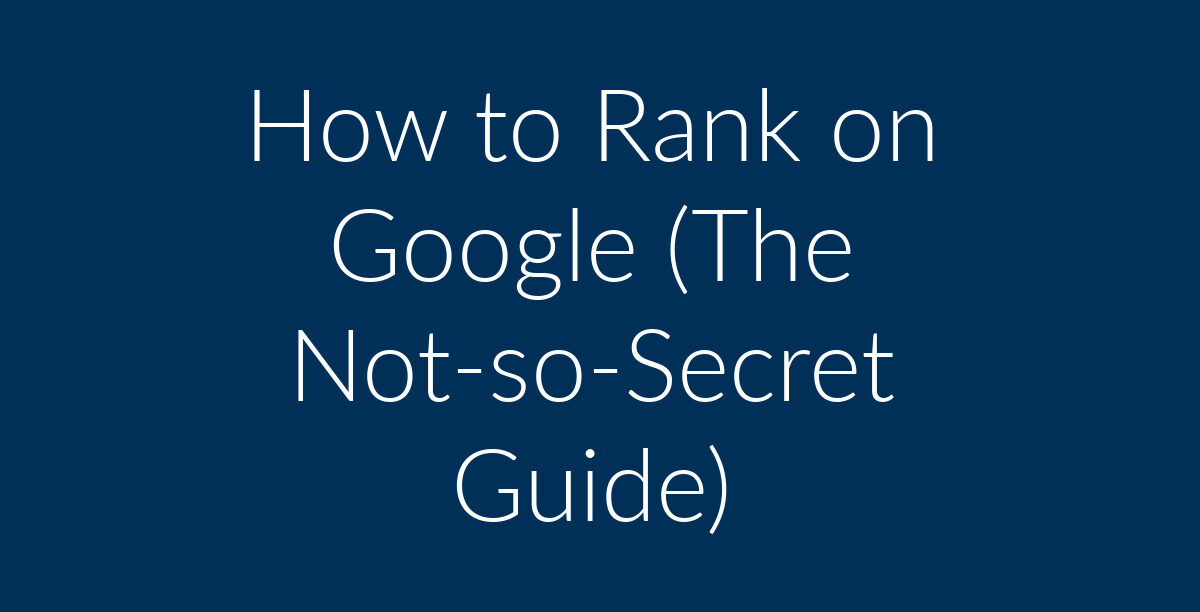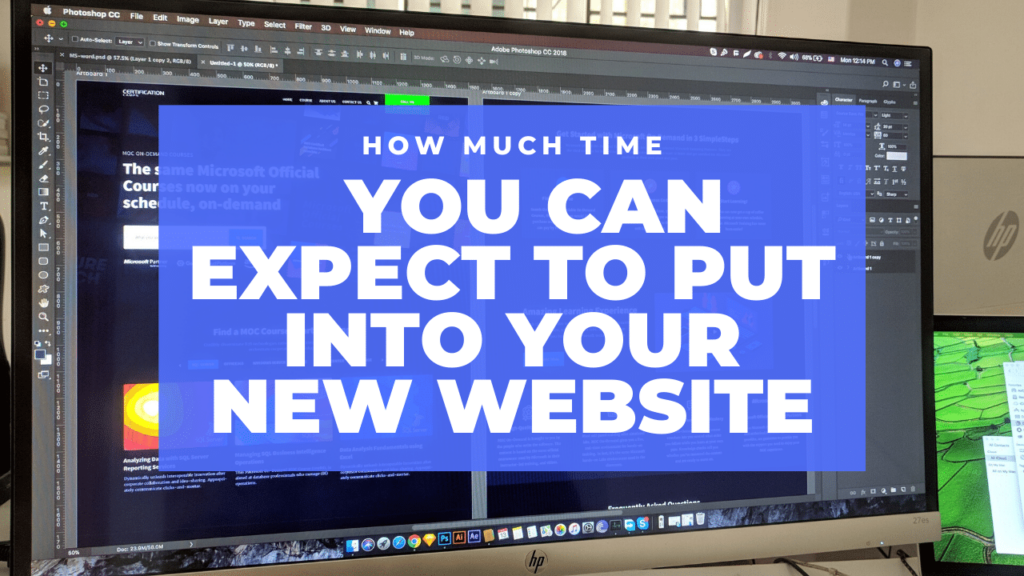Do you wish to learn how to rank on Google? If yes, then this article is for you. Hi, my name is Francisco, and I am the owner of Planet Marketing, a Digital Marketing Agency. My company specializes in Google Ads, Facebook Ads and SEO. One thing that I need to say right at the beginning is; it’s not easy to get a website or a web page to rank at the top on Google. If you are trying to hire an Agency and they tell you that you will get results today or tomorrow, then you need to walk away. They are trying to scam you! It takes time and patience to achieve a better Google ranking. This article gives you the tips that you need to follow to get there. The post has the following sections;
Why Ranking on Google Matters
For this example, let’s assume that you are the owner of a gym operating somewhere in the Florida suburb of Westchase. The challenge for you is to get people to your gym. What can you do to get people to your establishment? There are many solutions to this problem.
They include going around handing out leaflets, doing traditional advertising, advertising on Facebook and making calls to your prospects. However, in today’s operating environment, Google tends to be the biggest solution as far as generating leads for any business is concerned. Ranking on Google matters for the following reasons;
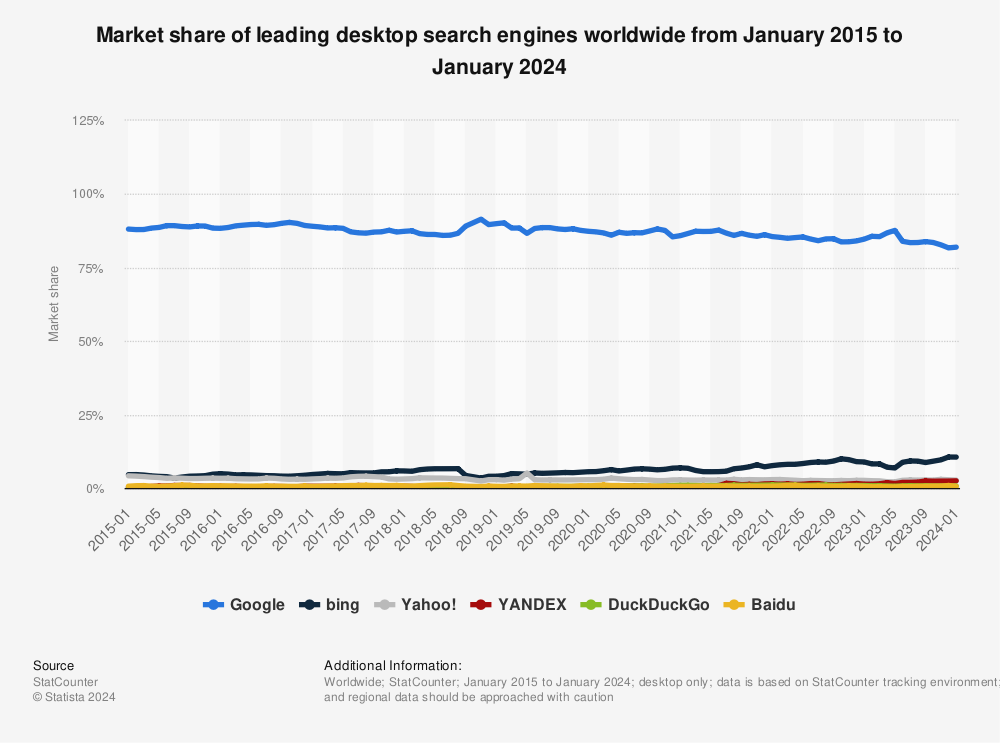 Find more statistics at Statista
Find more statistics at Statista
- Google is the biggest search engine in the world. It commands about 85% of the search engine market share. You can see the current statistics in the above graph from Statista. Google is, therefore, the platform on which you need to focus for your business.
- It’s not enough to simply appear in Google search results. What you should aim for is to appear at position one on Search Engine Result Pages for relevant keywords. The thing to note is that the higher your ranking is on Google, the more leads you are likely to attract. A web page that’s ranked at position 1 on Google gets 33% of traffic. If your web page is on number 2, then it will get about 18% of traffic. Number 3 gets about 9%. Very few people ever bother to go to page 2 on search results. Only about 25%. So, you need to be ranked as high as is possible.
Tips for Ranking High on Google
To be fair, this is a topic that has been covered extensively over the years. The process of getting a web page to rank high on Google is referred to as Search Engine Optimization (SEO). And SEO is a widely covered subject. In fact, some people have written wholes books showing how to rank on Google. In that regard, this guide is not so secret.
This article is unique in that we condense all that information into a manageable package. Please note that there a probably hundreds of things that you can do to get a higher Google ranking. In this article, we focus mainly on the most important steps.
In summary, if you want your web pages to rank on Google, you need to do the following;
- Carry out keyword research
- Target less competitive keywords
- Create relevant content
- Make sure that your content has value
- Do internal linking
- Share your content on social media
- Get backlinks
1. Carry Out Keyword Research
Keyword research is one of the first steps on the way to achieving a higher Google rank. Keywords are the search words and terms that people use when carrying out various queries on Google and on other search engines.
It’s important for business and individuals that wish to rank high to have a pulse on what people are saying. Basically, your content should answer to what people are saying to Google. That’s the best way of ensuring that people will find you within the clutter of billions of web pages.
If you can answer the questions that people have, you won’t have much difficulty getting your web pages to rank high on Google and on other Search Engines.
How to carry out keyword research
Keyword research is a huge topic on its own. I am only going to cover the basics here. There are many ways through which you can carry out keyword research.
The first method is the most intuitive. There are certain terms that people will naturally use when looking for specific products. If you own a restaurant, as an example, then you should be targeting search terms like; “restaurant near me.” You should also be targeting terms like “best restaurant [your location].”
The following are some of the other ways of carrying out keyword research;
Google Autocomplete
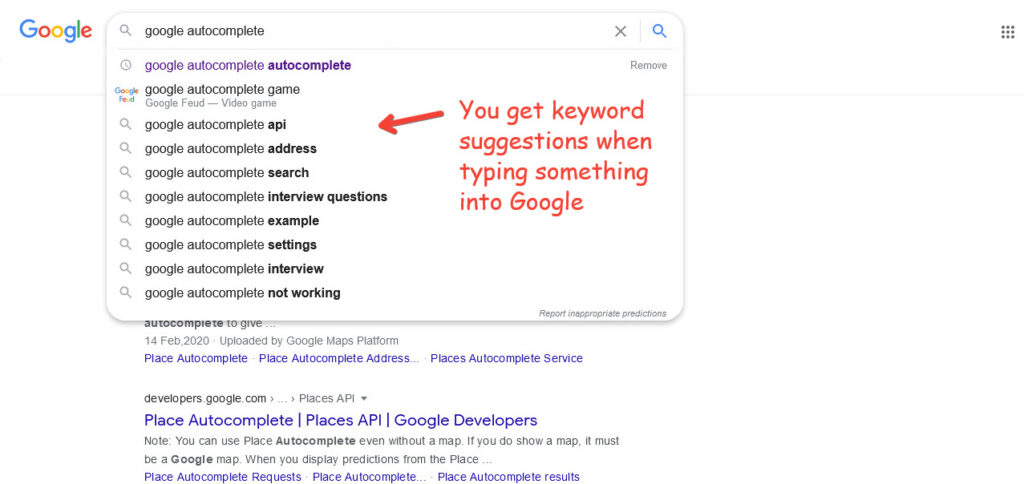
Use Google Autocomplete to get suggestions about trending keywords
Start typing something into Google, and you will get several keyword suggestions. These are the terms that others have used for similar searches. This auto complete feature can be useful when carrying out keyword research.
Before paying for a keyword research tool, you should simply head over to Google. Type in a query and you will get a lot of suggestions on potential keywords. You can then target these keywords in your content.
Of course, this feature is bare-bones as far as keyword research is concerned. It doesn’t tell you how many people have been making a particular search, as an example. But it’s a good starting point for researching keywords for any business.
The Keyword Planner Tool in Google Ads
If you advertise via Google Ads, you have another pretty useful Keyword Research tool right on your fingertips. The Keyword Planner tool is part of Google Ads. It provides a raft of suggestions on trending keywords for your particular line of business.
With this particular tool, you get insights into how many people have been using which search terms. You also get bid estimates for these keywords, which tends to be useful information if you advertise on Google.
Paid Keyword Research Tools
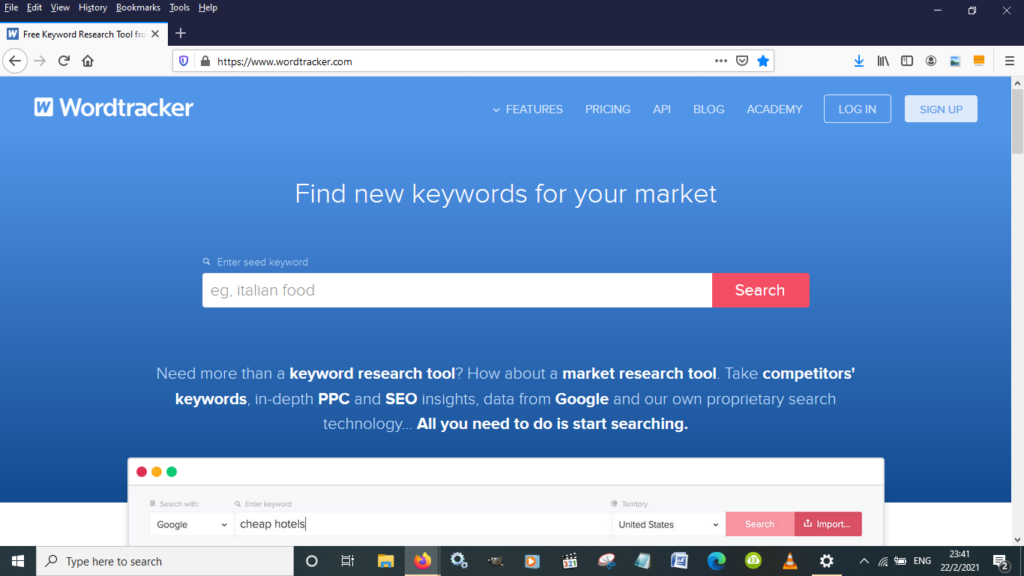
Wordtracker is a good example of a paid keyword research tool
There are many paid keyword research tools out there. An example is Wordtracker. Most SEO tools on the market today will also have a keyword research tool. An example is SEMrush. These tools come with multiple SEO functionalities that include keyword research.
2. Target Less Competitive Keywords
That’s another useful tip for those looking to rank high on Google. After carrying out research, you may have discovered that there are search queries that are typed into the search engine by millions of people every month. Then there are others that are used only a hundred or so times each month?
Which terms should you target then? Intuitively, you may wish to angle towards the popular search queries. However, chances are high that a lot of people are also targeting the same keywords. That makes it rather difficult for new players to make the much needed breakthrough.
Let me give you an example; one of the high paying keywords for bloggers is; “best web host.” If you create a page that’s ranked high on Google for this search, you will be able to earn quite a substantial amount of money. You can use affiliate marketing to earn from referral traffic. It’s possible to earn over $150 per referral. The result is that a lot of bloggers are targeting this search term. This makes it ultra competitive. It’s very unlikely for new players to reach position one on Google. Existing players already have thousands of backlinks pointing back to their articles. It’s useful, therefore, to try and target less competitive keywords. That way, you have something of a chance to get to the top on Google.
3. Target long-tail keywords
Long-tail keywords are pretty specific. That’s their power. They are made by people who are looking for particular products. These people are much more likely to convert than people who search using general keywords.
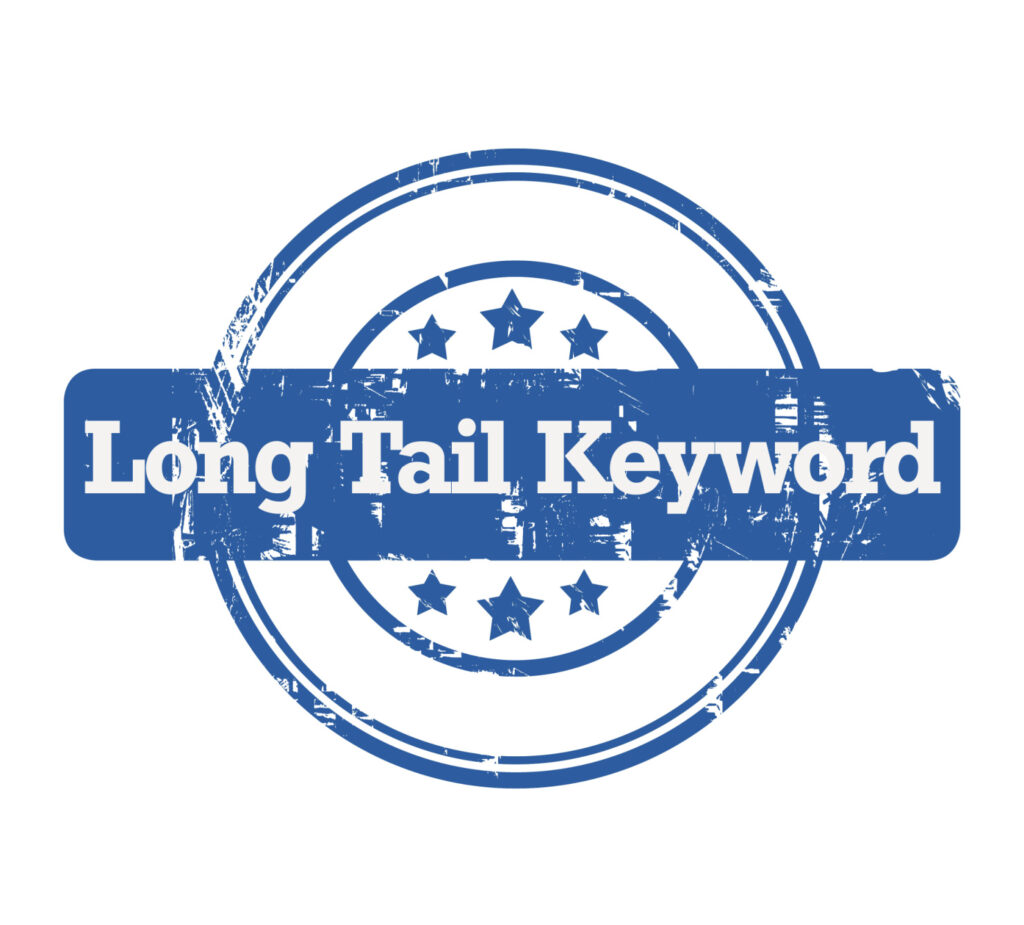
Long-tail keywords have less competition and you are likely to have better success targeting them
An example of a long-tail keyword would be something like; black pleated blouse. That’s being specific. This keyword is related to other keywords like female clothes, black blouse and so forth. But in this instance, the person is looking for the pleated variant. Such a query indicates a high intention to buy.
4. Use your target keywords in your content
First, you need to use your target keywords in your content. That’s a good way of telling Google what your content is about. If you are targeting a keyword such as “best web host under $10,” as an example, you would be advised to use this term a couple of times in your content.
But how many times should a target keyword be used in an article? One thing that you should try to avoid is to over optimize. If your content appears to have been stuffed with keywords, you will undercut your chances of ranking high on Google.
Fortunately, there are several SEO tools out there that you can use to strike the proper balance between keyword visibility and over-optimization. Yoast is a good example. This tool helps you create content that ranks high on Google by giving you SEO related pointers as you write your article.
5. Include other relevant keywords in your articles
For each article, you will have a main keyword that you are targeting. However, you will have noted while doing keyword research that there are auxiliary keywords that are used by people for the same queries.
You should target these keywords in your content. Fact is, the main keyword that you are targeting could be ultra competitive. However, you still have the chance to make a breakthrough using these auxiliary keywords.
6. Produce longer articles for better visibility
Sometimes you cannot help it and an article can only be so many words long. However, where possible, it’s better to produce longer articles. These give you better visibility to search engines, simply because you get the chance for more optimization for your target keywords. Your articles should be no less than 1000 words long wherever possible.
7. Do internal linking for your content

Links are important for making your content discoverable to search engines
Here you need to understand how search engines work. Google and other search engines have what are referred to as bots whose task is to crawl across the internet while indexing web pages. If you want to rank high on Google, you need to make sure that your web pages are crawlable.
One way of achieving this aim is to do internal linking for your web pages. You will already have web pages related to the ones that you are writing. As an example, you may be writing an article on the best web host for small businesses.
You would probably already have written an article on the most affordable web host. You can do internal linking to point these articles to one another. Having articles point to related articles creates bridges between your content. Search engines use these bridges to index your site’s content.
This gives you much needed visibility. Having internal links also promotes engagement with your readers. It decreases your bounce rate, which is another matrix used by Google for ranking web pages. Google believes that having people read only one page on a site is not a very good sign. So, it’s important to always work to reduce your bounce rate.
8. Have outbound links
Other than having links pointing to your own content on the same website, you should also have outbound links. These are links pointing to other web pages on other sites.
Again, these links are the avenues through which search engine bots crawl while indexing web pages. Having outbound links increases your site’s visibility, which gives it a higher rank on Google.
8. Avoid duplicate content
Duplicate content can have a detrimental effect on your Google rank. It’s always a good idea to have one comprehensive article for each major topic that you are covering.
Include relevant keywords and outlier keywords in that article. Don’t try to be clever by splitting keywords. It means you will only be competing against yourself, which can decrease your rank.
Sometimes duplicate content comes innocently enough. If you put an article into two categories, that’s regarded as duplicate content. It can have a negative impact on your ranking. So, these are all technical SEO issues that you need to be aware of.
9. Avoid broken links
Still on the subject of links, try to keep your site as sanitary as is possible. You should eliminate everything that has a negative impact on your SEO. That includes broken links.
The good news is that there are tools out there that you can use to check for broken links. One of these is the aptly name Broken Link Checker for WordPress. Once a broken link has been identified, you have the option to repair, remove or replace it.
10. Make sure that your content has value
Most people are so internally focused that they forget what content is all about. Really, it’s all about creating value for the reader. That’s the major reason why how-to articles tend to be so popular. They provide readers with valuable information. That’s something that you should gun for.
Provide your readers with useful tips, and they are likely to find your content worth their while. From there, they will want to share your articles. They will also want to link to your articles. This has the cumulative effect of giving your articles greater visibility on search engines.
11. Get Backlinks

Backlinks are one of the most important SEO components
Backlinks are probably the most important factor as far as getting a web page to rank high on Google is concerned. You absolutely need them to get greater visibility. The logic behind backlinks is that people are most likely to link to content that’s great for their readers.
So, a web page that has many backlinks pointing to it is regarded by Google as being more authoritative than one that has fewer backlinks. The result is that backlinks are the single factor that can give your web pages the much needed boost. But how do you get backlinks?
You can get backlinks the organic way
Google wants you to get backlinks the organic way. It means you should produce great content that naturally attracts links. That’s all very great. However, this method of getting backlinks can take years to come to fruition.
Carry out link building
Backlinks are important, which is why their acquisition has spawned a thriving industry across the globe. There are people out there whose profession is to reach out to other bloggers for backlinks. And they get paid to do so.
Anyway, a better way of attaining backlinks is by doing link building work. You can start by guest posting on other people’s sites. That’s probably the most popular approach. If you create useful content, others will want to publish this content on their sites. You will then have a chance to get your links on these sites.
12. Share your content on Social Media
Sharing your content on social media is another strategy that you can use to rank high on Google. Most experts are in agreement that social signals are a ranking factor as far as search engines are concerned. What you need to gun for is to have your articles and videos shared by as many people as is possible.
One approach is to have each post that you publish automatically pushed to Facebook, Twitter and other social media platforms. There are many tools that give you this functionality.
Social sharing ensures that as many people as is possible are seeing your content. If your articles have value, they will be shared across the internet and you will get more links. That, in turn, gives you a higher rank on Google.
Facebook Marketing
Facebook Ads marketing is a topic that I have covered a lot on this blog. It’s another way of giving your content greater visibility on Google and other search engines. After publishing your articles, as an example, you can boost them on Facebook.
Boosting a post can be done for as little as a $1. That way, you will be able to reach thousands of people beyond your circles of friends and followers. Doing this means a lot more people will be sharing your content.
13. Make your site mobile friendly
Being mobile-friendly is now a very important ranking factor. It’s something that you should consider for your site. Make sure that everything is optimized for mobile.
That’s important because about 60% of all search queries today are from mobile devices. Not only that, but mobile queries have a higher conversion rate than desktop queries.
So, being mobile-friendly is a good way of getting a high rank on Google. In fact, Google itself mentions that mobile-friendly pages are ranked higher on search results. So, this is important.
Summary
That’s how to rank high on Google. To be frank, there are many more tips out there. As noted earlier, you will get complete books on the internet on the subject.
The aim of this article was to condense everything into a manageable size. At the end of the day, all those books and encyclopedias can be summarized in a few words.
To get a better ranking, you need to have relevant, well-researched, well-written content. Promote this content on social media and on other sites and you will gain much needed visibility.
Do you wish to get more marketing tips? Sign up for the Planet Marketing newsletter today to join thousands of others who are already benefiting from our work!

